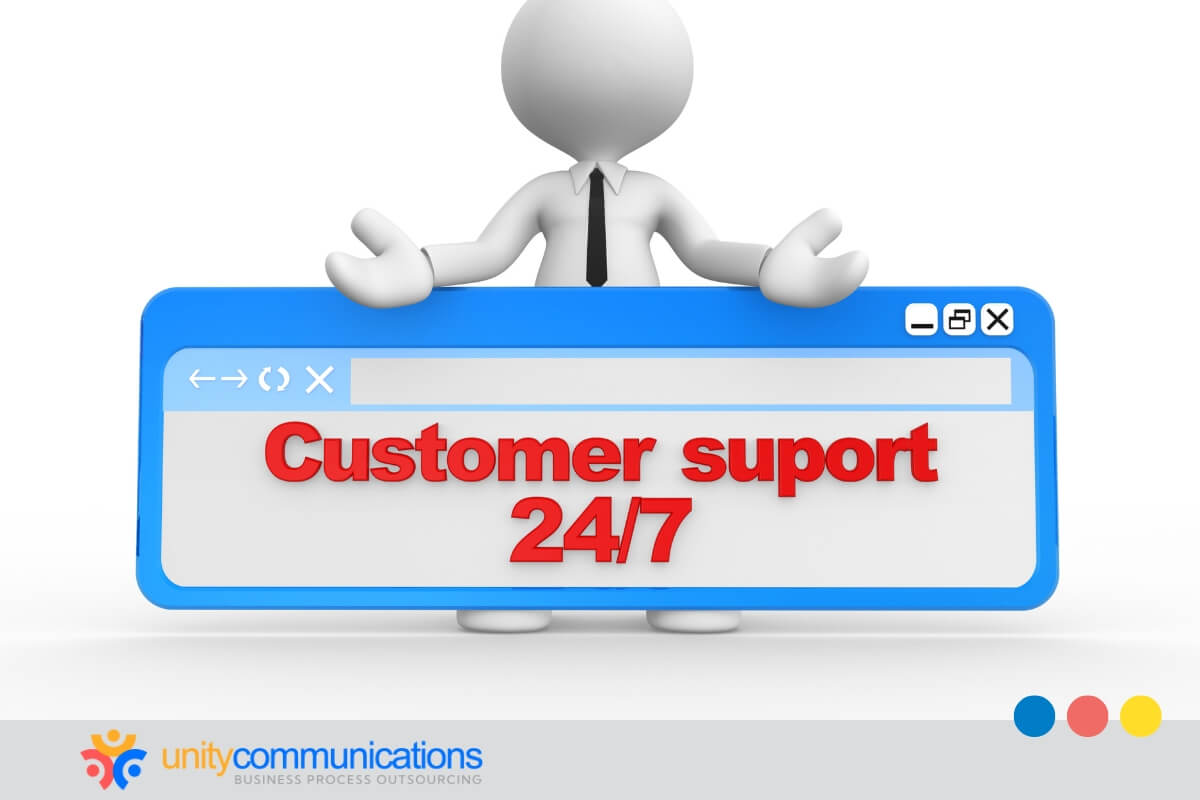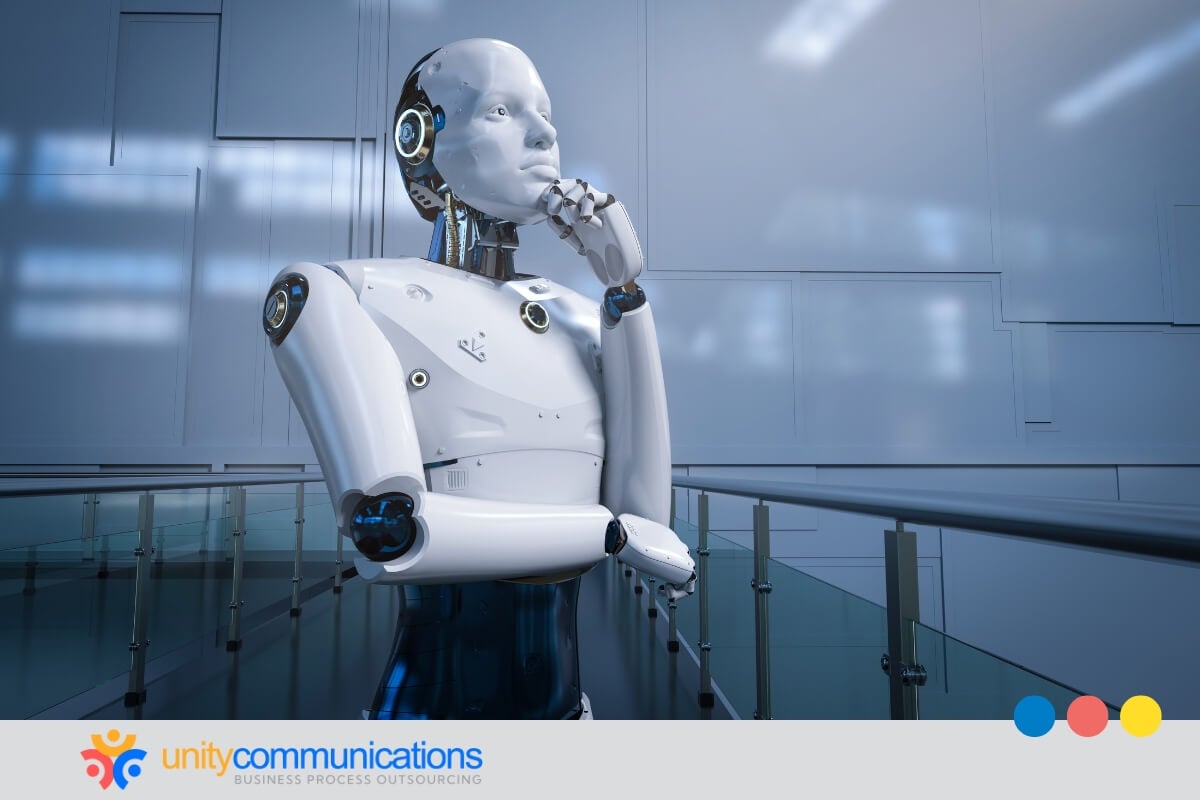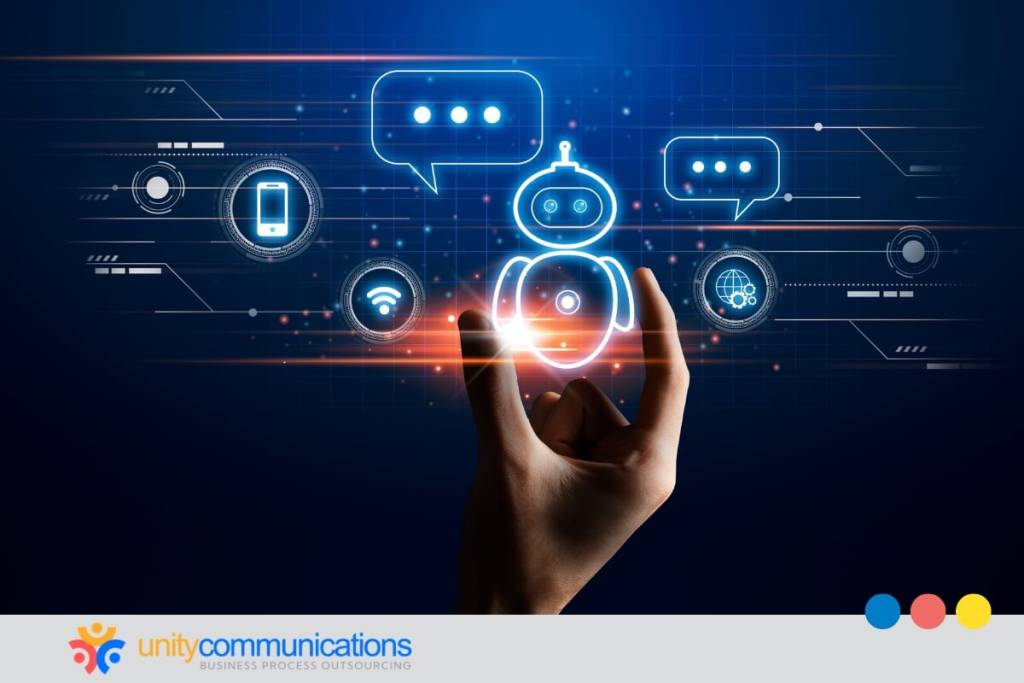IN THIS ARTICLE
Table of Contents
Artificial intelligence (AI)-powered chatbots and intelligent virtual assistants (VAs) are gaining popularity for delivering excellent customer service and sales support across different channels and platforms. Nevertheless, creating and sustaining an efficient chatbot or VA tool demands considerable time, resources, and expertise.
Business process outsourcing (BPO) presents many advantageous solutions for VA and chatbot development that companies should consider leveraging.
This article explores the role of BPO solutions in developing VAs and chatbots and how these technologies improve customer support quality. Keep reading to learn more!
The Role of BPO Solutions in VA and Chatbot Development

A chatbot is a software program that engages in user conversations by processing text and audio inputs and generating contextually relevant responses. It undertakes tasks such as resolving technical issues, addressing customer inquiries, and offering customer support.
Rule-based chatbots adhere to a more traditional approach, relying on predefined rules and scripted responses to manage user interactions. In contrast, AI-powered chatbots leverage technologies such as machine learning (ML) and natural language processing (NLP) to provide more interactive conversational experiences.
An AI-powered VA is a digital application or piece of software that employs AI technologies such as NLP, artificial emotional intelligence, ML algorithms, and deep learning to autonomously execute tasks. It can schedule appointments, set reminders, offer directions, make purchases, and control smart devices.
So, what is BPO’s role in VA and chatbot development? BPO solutions are designed to automate and enhance customer interactions, engagement, and business operations. Here are several ways BPO contributes to the development and utilization of VAs and chatbots:
- Development and programming. BPO companies often employ dedicated teams of developers and programmers who specialize in creating VAs and chatbots. These teams design, code, and test the functionalities of AI-driven solutions.
- Data annotation and training. VA and chatbot training require large datasets with annotated information. BPO firms can assist in collecting, annotating, and organizing data, ensuring that the AI models are trained on diverse and accurate information.
- NLP development. BPO solutions contribute to the development of NLP capabilities, allowing VAs and chatbots to understand and respond to human language more effectively. They help refine algorithms, improve language models, and enhance linguistic analysis.
- Multichannel integration. BPO teams work on integrating AI-powered VAs and chatbots across multiple channels in the contact center, including websites, mobile apps, social media, and messaging platforms. They ensure a seamless and consistent customer experience across various touchpoints.
- Continuous improvement. BPO providers are part of the ongoing improvement of VAs and chatbots. By analyzing user interactions, feedback, and performance data, these companies can refine algorithms, update knowledge bases, and enhance the overall capabilities of the AI solutions.
- Industry-specific customization. Third-party vendors work with businesses from various industries and can customize VAs and chatbots to meet specific industry requirements. They can tailor language models, integrate industry-specific knowledge, and adapt the tools to unique business processes.
- Compliance and security. BPO teams ensure VAs and chatbots adhere to industry regulations and security standards. This function is crucial, especially in industries where sensitive information is handled, such as healthcare or finance.
How BPO-powered Chatbot and VA Solutions Enhance Customer Support

BPO solutions for VAs and chatbots can significantly improve customer service, enhancing efficiency, accessibility, and overall customer satisfaction. Here are several ways in which chatbots contribute to improving customer service:
- Enhanced support and interaction. BPO firms use VAs and chatbots to streamline customer service processes. These AI-driven solutions can handle routine questions, provide information, and guide users through basic problem-solving, freeing up human agents to focus on more complex issues.
- Round-the-clock availability. VAs and chatbots developed with the help of BPO companies enable businesses to provide 24/7 customer support. This continuous availability increases customer satisfaction by addressing questions and concerns at any time, irrespective of time zones.
- Better cost savings. The standard pricing for basic chatbot projects typically ranges between $10,000 and $50,000. BPO organizations leverage labor cost differences and advanced technology to reduce operating costs. VAs and chatbots also allow human workers to focus on higher-value tasks, resulting in significant business cost savings.
- Instant response times. Chatbots offer instant responses to customer questions, eliminating the need for customers to wait in long queues or endure lengthy response times. This convenient, quick turnaround enhances the overall customer experience. In fact, 70% of consumers will pay more for a convenient experience.
- Automated tasks. VAs and chatbots excel at handling routine and repetitive tasks, such as providing basic information, answering common questions, and guiding users through standard processes. They can resolve 70% of customer interactions, allowing human agents to zero in on more complex and personalized interactions.
- Scalable processes. Bots are scalable and can handle a large number of simultaneous conversations without a decrease in performance. This scalability ensures businesses can efficiently manage increased customer interactions during peak times without compromising service quality.
- Personalized offerings. Advanced chatbots and AI-powered VAs can provide personalized interactions by analyzing user data and tailoring responses to individual preferences. This personal touch enhances customer engagement and satisfaction.
The Future of Outsourced VA and Chatbot Development

Several key trends and advancements will shape the future of BPO solutions for VAs and chatbots. As technology evolves and businesses seek more sophisticated solutions, here are some aspects that may define the future of outsourced development in this domain:
- Advanced AI and ML. The next generation of VAs and chatbots will likely incorporate more advanced AI and ML capabilities. Some examples of their features are improved NLP, contextual understanding, and the ability to learn from user interactions to provide more personalized and accurate responses.
- Conversational user interfaces (CUI). Future VAs and chatbots are likely to focus on enhancing CUI. This process involves making interactions more natural, human-like, and capable of understanding complex user inputs, allowing for more sophisticated conversations and problem-solving.
- Multimodal capabilities. VAs and chatbots will likely evolve to support multiple modes of communication, including voice, text, and potentially even visual inputs. This capability enables a more seamless and versatile user experience across different devices and platforms.
- Integration with emerging technologies. Integrating emerging technologies such as augmented reality (AR) and virtual reality (VR) is possible. They could enable VAs to provide more immersive and interactive experiences, particularly in the e-commerce, education, and healthcare industries.
The Bottom Line
BPO providers contribute significantly to the development and deployment of VAs and chatbots by providing technical expertise, data management services, customer support solutions, and continuous improvement strategies. As businesses increasingly embrace automation, the role of BPO in this space will likely expand further.
If you’re in the market for a BPO partner to develop AI-powered VA and chatbot tools, Unity Communications can help. Let’s connect to find out more.





